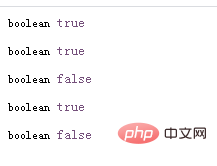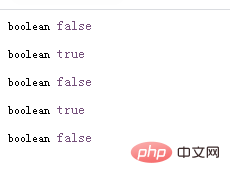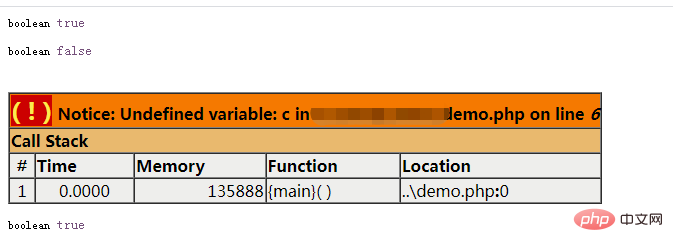How to check null values using PHP (4 methods)
In the previous article "PHP Array Learning: How to Remove Blank or Duplicate Elements", we learned that we can use the empty() function to determine whether a value is empty. So what are the ways to check null values in PHP? This time we will learn about several common methods. If you need it, you can learn about it~
The theme of today’s article is: using PHP to detect whether a value is empty or not. Okay, let’s get straight to the point. Here are some common methods.
Method 1: Use empty()
empty function: detect whether the variable is "empty"
Any uninitialized variable, the value is 0 or false or empty string "" or null variables, empty arrays, objects without any attributes will be judged as TRUE.
Let’s take a closer look at the code example:
<?php
$a = 'test';
$b = array('key1' => 'value1');
$class = new stdClass();
var_dump(empty($c)); // 输出 bool(true)
var_dump(empty($b['key2'])); // 输出 bool(true)
var_dump(empty($class)); // 输出 bool(false)
var_dump(empty($class->test->test)); // 输出 bool(true)
class EmptyClass{};
$empty_class = new EmptyClass();
var_dump(empty($empty_class));// 输出 bool(false)
?>Output result:

The following variables will be considered empty Is empty:
"" (empty string)
0 (0 as an integer)
0.0 (0 as a floating point number)
"0" (0 as a string)
NULL
FALSE
array() (an empty array)
$var; (one declared, But variables with no value)
Learn about
0,'0','',null、falseThe difference between these five types.
null means non-existence: the value is not stored in the zval space at the bottom of PHP, only a type mark IS_NULL is stored.
And 0, '0', '', false these four exist, the bottom layer of php is to open up zval space storage, with value and type.
string '0' is not equal to string ''
int 0 is equal to string '' null, (non-identical comparison, PHP will do type conversion)
string '0' is not equal to null, int 0 is equal to null
Method 2: Use isset()
isset function: determine whether the variable has been initialized and can be used to test whether the variable has been configured. Returns true if the variable already exists; returns false otherwise.
Let’s take a look at the code example below:
<?php $a = 'test'; $b = array('key1' => 'value1'); $class = new stdClass(); var_dump(isset($class->test->test)); // 判断对象属性是否定义:输出 bool(false) var_dump(isset($a)); // 判断变量是否定义:输出 bool(true) var_dump(isset($c)); // 判断变量是否定义:输出 bool(false) var_dump(isset($b['key1'])); // 判断数组元素是否定义:输出 bool(true) var_dump(isset($b['key2'])); // 判断数组元素是否定义:输出 bool(false) ?>
Output result:

Method 3: Use is_null()
is_null function: detect whether the variable is "null".
When a variable is assigned a value of "null", the detection result is true; 0, empty string, false, and empty array are all detected as false.
Let’s take a closer look at the code example:
<?php $a = null; $b = false; var_dump(is_null($a)); var_dump(is_null($b)); var_dump(is_null($c)); ?>
Output result:

Method 4: Use == or === operator
can use
var == nullto determine whether the variable is "null". When a variable is assigned a value of "null", the detection result is true; while 0, empty string, false, and empty array are all detected as false. If the variable is not initialized, the program will report an error.
The essence is that the == expression will perform automatic type conversion on the variables on both sides, so the judgment result is true.
Let’s take a look at the code example below:
<?php $a = 0; $b = array(); var_dump($a == null); var_dump($b == null); var_dump($c == null); ?>
- ##You can use
var === null
To detect whether the variable is "null", the type of the variable must also be "null". When judging "null", equal to is_null has the same effect.
<?php $a = 0; $b = false; $c = 0.0; $d = null; $e = ''; var_dump(0 === $a); // 输出 bool(true) var_dump(0 === $b); // 输出 bool(false) var_dump(0 === $c); // 输出 bool(false) var_dump(0 === $d); // 输出 bool(false) var_dump(0 === $e); // 输出 bool(false) var_dump('' === $e); // 输出 bool(true) var_dump('' === $a); // 输出 bool(false) var_dump('' === $b); // 输出 bool(false) var_dump(0.0 === $c);// 输出 bool(true) var_dump(0.0 === $a); // 输出 bool(false) ?>
The above is the detailed content of How to check null values using PHP (4 methods). For more information, please follow other related articles on the PHP Chinese website!

Hot AI Tools

Undresser.AI Undress
AI-powered app for creating realistic nude photos

AI Clothes Remover
Online AI tool for removing clothes from photos.

Undress AI Tool
Undress images for free

Clothoff.io
AI clothes remover

AI Hentai Generator
Generate AI Hentai for free.

Hot Article

Hot Tools

Notepad++7.3.1
Easy-to-use and free code editor

SublimeText3 Chinese version
Chinese version, very easy to use

Zend Studio 13.0.1
Powerful PHP integrated development environment

Dreamweaver CS6
Visual web development tools

SublimeText3 Mac version
God-level code editing software (SublimeText3)

Hot Topics
 CakePHP Project Configuration
Sep 10, 2024 pm 05:25 PM
CakePHP Project Configuration
Sep 10, 2024 pm 05:25 PM
In this chapter, we will understand the Environment Variables, General Configuration, Database Configuration and Email Configuration in CakePHP.
 PHP 8.4 Installation and Upgrade guide for Ubuntu and Debian
Dec 24, 2024 pm 04:42 PM
PHP 8.4 Installation and Upgrade guide for Ubuntu and Debian
Dec 24, 2024 pm 04:42 PM
PHP 8.4 brings several new features, security improvements, and performance improvements with healthy amounts of feature deprecations and removals. This guide explains how to install PHP 8.4 or upgrade to PHP 8.4 on Ubuntu, Debian, or their derivati
 CakePHP Date and Time
Sep 10, 2024 pm 05:27 PM
CakePHP Date and Time
Sep 10, 2024 pm 05:27 PM
To work with date and time in cakephp4, we are going to make use of the available FrozenTime class.
 CakePHP File upload
Sep 10, 2024 pm 05:27 PM
CakePHP File upload
Sep 10, 2024 pm 05:27 PM
To work on file upload we are going to use the form helper. Here, is an example for file upload.
 CakePHP Routing
Sep 10, 2024 pm 05:25 PM
CakePHP Routing
Sep 10, 2024 pm 05:25 PM
In this chapter, we are going to learn the following topics related to routing ?
 Discuss CakePHP
Sep 10, 2024 pm 05:28 PM
Discuss CakePHP
Sep 10, 2024 pm 05:28 PM
CakePHP is an open-source framework for PHP. It is intended to make developing, deploying and maintaining applications much easier. CakePHP is based on a MVC-like architecture that is both powerful and easy to grasp. Models, Views, and Controllers gu
 CakePHP Creating Validators
Sep 10, 2024 pm 05:26 PM
CakePHP Creating Validators
Sep 10, 2024 pm 05:26 PM
Validator can be created by adding the following two lines in the controller.
 How To Set Up Visual Studio Code (VS Code) for PHP Development
Dec 20, 2024 am 11:31 AM
How To Set Up Visual Studio Code (VS Code) for PHP Development
Dec 20, 2024 am 11:31 AM
Visual Studio Code, also known as VS Code, is a free source code editor — or integrated development environment (IDE) — available for all major operating systems. With a large collection of extensions for many programming languages, VS Code can be c




)
)


